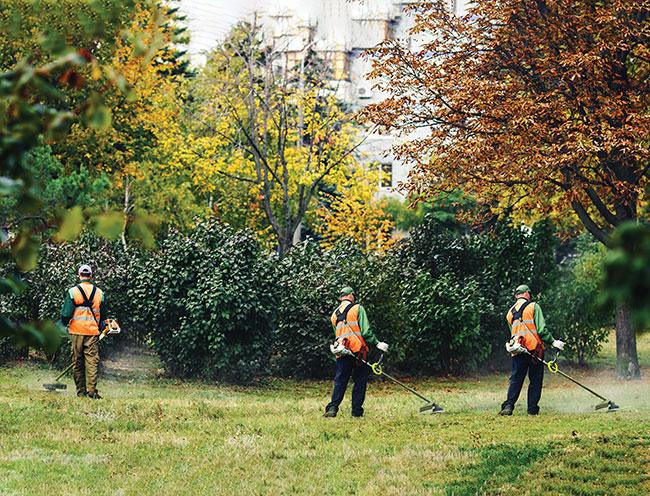
Features
Landscaping
Landscape contractors must shift paradigm to connect with employees and grow company
Shift in thinking will help retain staff, build productivity
February 9, 2023 By Mike Jiggens
 By buying into a paradigm shift that leads to a more modern way of managing staff, landscape contractors can realize a more engaged staff, greater employee retention, a stronger company culture and a better bottom line.
Photo: © Marina Varnava/Adobe Stock
By buying into a paradigm shift that leads to a more modern way of managing staff, landscape contractors can realize a more engaged staff, greater employee retention, a stronger company culture and a better bottom line.
Photo: © Marina Varnava/Adobe Stock If a landscape contractor wishes to hire the right employees, create a solid company culture, produce engaged staff, form a productive team and retain good workers from year to year, he or she must understand a paradigm shift is occurring, and failing to adapt to it will lead to a disconnection of people that will fail to grow the company.
Jacki Hart, a former Muskoka-based contractor who now works as a landscape business coach helping other contractors grow their businesses, shared her school of thought with landscape contractors and managers attending January’s 50th Landscape Congress conference and trade show in Toronto.
Business leaders once believed that people plus performance equaled profit. Employees were to show up, work hard and go home at the end of the day, figuring that if they did a good job, they wouldn’t be in trouble. The definition of work in terms of how people are treated in the workplace has since been altered by millennials who have revolutionized how people are valued, Hart said.
“Without millennials, we’d still be focused on people plus performance equals profit,” she said, adding the philosophy has since given way to people plus purpose equals performance. “When you have a high performing team, are you profitable? Don’t focus on profit, but rather performance. We focus on performance by having a team with a purpose, goals and a strong culture. Creating that purpose will help you get buy-in.”
Buy-in is about purpose, Hart said, noting new employees don’t arrive on the job already engaged. A contractor who understands the current paradigm shift provides an opportunity and a purpose for his employees and invites them to become part of a team. If they resonate with the purpose, they’ll buy in.
“You can’t force buy-in, and you can’t force engagement.”
It’s important for today’s leader to better relate with his or her employees, she said,
“It’s something to show your team that you care and are paying attention to how their life is being impacted outside of your gate.”
Many employees are concerned about such matters as inflation and their ability to cope with the increased cost of living. In her discussions with landscape contractors, Hart said many have toyed with the idea of profit sharing or awarding bonuses to staff but are unsure how best to go about it, wondering if larger rewards should go to longer-serving employees or if they should be distributed equally. Hart said the cost of living impacts all staff, no matter how long they’ve been employed by their company.
Exercise sensitivity
Leaders and employers must be sensitive to employees’ economic fears, she said, especially with rent increases and escalating interest rates affecting mortgages.
“There may be people leaving your team for a job that they need as opposed to a job that they want.”
Contractors who wish to retain employees who have such concerns can conduct budgeting seminars that allow staff to learn how to better balance a household budget and discover other ways to save. The employer may also wish to introduce an employee savings plan in which money is invested into a savings account, allowing for funds to be drawn by the employee in the event of an emergency.
Some employees may have issues with childcare that may preclude them from working a standard shift five days a week. When Hart founded her own landscaping business in 1990, she required her employees to begin work at 7 a.m. Monday to Friday and every other Saturday and not end the day until 6 p.m.
“That’s not the world we’re living in now.”
Contractors who continue to run their businesses that way and are having difficulty finding sufficient staff must change their way of thinking, Hart said.
She posed the notion of assembling part-time work crews who might be available to work only three or four days a week. Perhaps their truck and equipment can be effectively utilized the other day or two. Staff could possibly be cross trained so that more people can tackle different tasks. If someone is absent from his team for a day, others are better equipped to temporarily step into another role.
Not having enough staff or losing employees due to high turnover is a major concern of landscape contractors today. The problem can’t be solved by using the same thought process that created it, Hart said. Since COVID, attracting and hiring staff has changed because people possess life pressures they didn’t have previously, and it’s important for contractors to understand that life doesn’t stop at the gate, she added.
People often leave their employment in the landscaping industry for higher paying work in unionized construction or assembly line jobs.
Earning a living wage
Contractors wondering if their staff are earning a proper living wage can visit livingwage.ca and see how the wages they pay compare to the living wages listed according to the various geographic regions in Canada.
“Check it and see where you are. How do you measure up? What’s the entry level living wage that you’re paying? If it’s too low, you’re going to have high turnover.”
In times of high turnover, a company’s most productive employees will no longer be as productive, Hart said. A top paid foreman on a construction crew might be spending 30 to 40 per cent of his time keeping an eye on a newer employee. The “stickier” a company is, the less turnover is realized, allowing team members to better perform. Stress is reduced while effectiveness increases.
Contractors put themselves at risk in terms of equipment safety when they have high rates of turnover. An employee who earns $35 an hour might produce only $25 an hour of work if he’s continually having to train someone new. If an entry level wage is increased by $2 or $3 an hour, the company will come out ahead, Hart said.
“What is it costing you to not pay a living wage?”
If a more experienced employee isn’t being paid what he’s worth, his services are apt to be lost to a competitor, she added.
“You want to be the employer of choice. You want to be that employer who has offered the best possible opportunity.”
A good employer will provide a positive company culture, an entry level package, compensation, a life balance and other incentives.
It’s a pull versus push concept to have people work with contractors as opposed to working for them, Hart said.

Not having enough staff or losing employees due to high turnover is a major concern of landscape contractors today.
Photo: © VisualArtStudio/Adobe Stock
Generational toolboxes
Each employee’s personal “toolbox” differs among the generations. Such matters as resilience, focus, work ethic, commitment, self-confidence and communications skills differ drastically between baby boomers and Gen Z employees, she said.
“That personal toolbox for Gen Z doesn’t seem to contain the same level of resilience to stress, ability to cope with fear and uncomfortable situations. Anxiety is a curse of Gen Z and younger millennials.”
Hart recommended contractors have conversations with their team members to learn what might be causing them stress or anxiety, asking them such questions as how they’re coping with daycare or parental care.
“When you show them that you care, you’ll have buy-in,” she said, adding it’s important to be the leader staff need. “You can’t do that unless you ask them (about what is causing them stress or anxiety).”
Contractors should be supportive of their employees’ personal growth and learn what interests them, Hart suggested.
“You need to help them find their own joy.”
By “lighting up” staff, they’ll be inspired to remain with the company. “That’s new age leadership.”
Most books about leadership are outdated, Hart said, because just as millennials “broke the mould,” so, too, has Gen Z.
If everyone on the team has a purpose and is set up to succeed, leaving at day’s end proud of a personal accomplishment, both buy-in and engagement will have been achieved.
The industry’s seven most expensive words – “Because we’ve always done it this way” – no longer applies when it comes to leading and managing teams, Hart said.
“You need to shift your paradigm if you’re approaching managing and leading a team in the same way as you always have. You’re probably setting yourself up to fail with respect to engagement and buy-in.”
Print this page